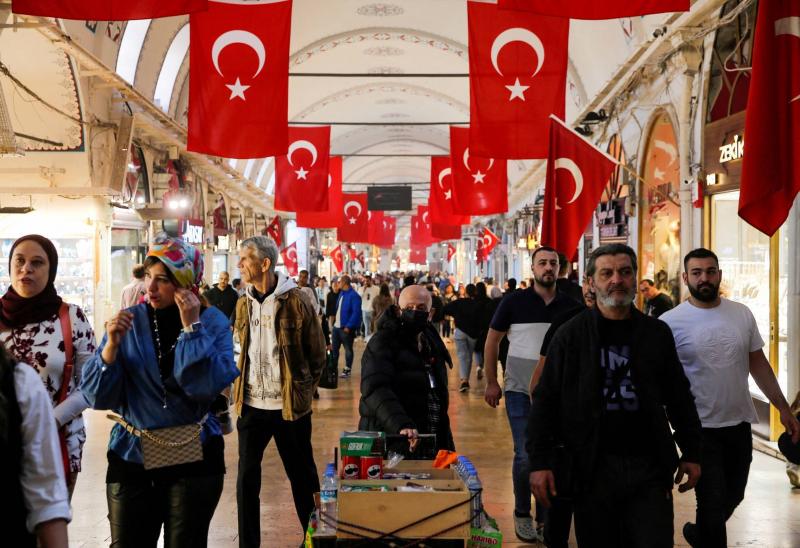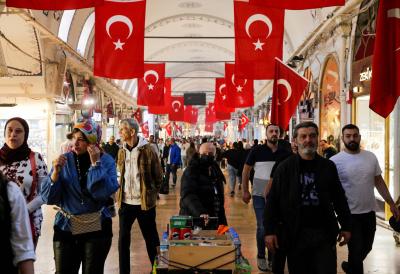The Turkish lira has reached a record low ahead of a crucial presidential election round on Sunday, and it appears to be losing its appeal to investors concerned about the potential outcomes if Recep Tayyip Erdoğan remains in power. The unconventional policies advocated by the 69-year-old president, aimed at achieving growth, have led to an 80% drop in the lira's value over the past five years, exacerbating inflation issues and eroding Turkish citizens' trust in their currency.
Since the painful 2021 crisis, the authorities have increasingly intervened in the foreign exchange markets, to the extent that some economists are now openly discussing whether the lira can still be considered freely floated. Daily movements of the lira have become unusually small and are primarily heading in one direction: downward.
Export companies are now required to sell 40% of their foreign currency revenues to the central bank, while a plan to protect bank deposits from exchange rate fluctuations, which helped eliminate disturbances in 2021, remains a crucial defensive measure despite being potentially costly. Paul McNamara, director of emerging market debt at GAM Asset Management, stated, "The basic thing is to artificially keep the lira's value."
Depositors placed about $33 billion into bank accounts protected under the plan in the past two months, bringing the total to $121 billion—nearly a quarter of all Turkish deposits. McNamara added, "Essentially, it is impossible to find a simple and good solution to all of this."
Credibility
In recent days, government sources have indicated that a dispute is currently ongoing regarding whether to maintain the current economic strategy prioritizing low interest rates or to pivot to more traditional policies after the elections. The close administration of the lira has limited its decline to just over 2% since the first round of the presidential elections two weeks ago; however, other major markets indicate strong concerns that Erdoğan will not change his course.
The cost of insuring Turkish debt against default has risen by 40%, international bonds have dropped by between 10% and 15%, and key volatility measures in the foreign exchange market have hit record highs for the coming year or more. Daron Acemoğlu, a professor at MIT, stated that the problem lies in the combination of policies and dwindling foreign currency and gold reserves. He added, "I am convinced that what we have now cannot last." He questioned, "Are dollar-protected lira accounts credible?" pointing to the potential cost to the government in the event of a full-blown crisis and the fact that parallel exchange rates are now widely quoted in Turkish markets due to demand for dollars. He said, "We are going back to the 1990s," referencing a period leading up to one of Turkey's most severe crises, which culminated in a sharp decline in the value of the currency in 2001.
Has the Final Countdown Begun?
Eyes are now on foreign currency reserves and the lira as it surpasses the 20 level against the dollar, marking the latest milestone in its long decline. Acemoğlu believes it is difficult to predict whether a crisis will occur or when it might happen. A robust tourist season is expected to temporarily boost reserves, and state coffers have recently received inflows from "friendly" Gulf countries and Russia.
Post-election questions are casting shadows over the markets. In the lead-up to the elections, analysts at JPMorgan anticipated that the lira would drop to 30 against the dollar without a clear shift toward traditional policies. These analysts are now assuming that Erdoğan will ensure victory on Sunday and will fulfill his campaign promises to increase income and rebuild the country after the February earthquake.
Some investors are worried that should the market recover, the authorities may resort to stricter capital controls, an issue the government has repeatedly stated it is not considering while attempting to close a $230 billion external funding gap—25% of the country's GDP.
Over the years, the government has relied increasingly on international lira lending markets, to the extent that the Bank of England's data shows that trading in major centers like London has shrunk to less than $10 billion per day on average, down from $56 billion in 2018. The growing imbalances in the currency market have tempered the optimism that previously brought many foreign investments to Turkey. Regarding the peak of mergers and acquisitions in the banking sector, Acemoğlu noted that those assets were not viewed as cheap but rather as jewels. When asked about the situation Erdoğan is facing now, assuming he wins, he said, "I don't necessarily see an easy way out."




